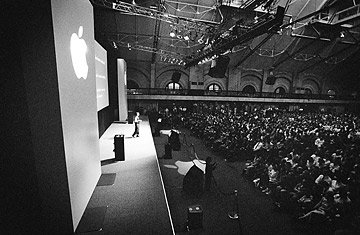
Boston's 1997 MacWorld Expo listens to Jobs on stage.
(5 of 7)
Little by little, Jobs started acting less like a turnaround artist and more like a man who wanted, once again, to change the world. "Victory in our industry is spelled survival," he told TIME in 2001, when Apple was still on the rebound. "The way we're going to survive is to innovate our way out of this."
In May of that year, Apple had opened retail locations in McLean, Va., and Glendale, Calif., the first of hundreds it has built. Jobs micromanaged their construction to an almost pathological extent--not only did he know which quarry the stone tiles came from, but he also knew from which side. The result was spare, uncluttered perfection. Retailers rarely did a good job of explaining to consumers why they should choose a Mac over cheaper Windows computers; now Apple could do the job itself, in miniature theaters of its own devising. Jobs outboxed the big-box stores, and he did it in his spare time.
The single most important moment in Apple and Jobs' redemption came six weeks after the 9/11 attacks. At a relatively low-key press event at Apple's Cupertino, Calif., headquarters, Jobs explained that the company had decided to get into the MP3-player business. Then he pulled the first iPod out of his pocket. All of a sudden, Apple was a consumer-electronics company.
Soon it was an exceptionally successful consumer-electronics company. Apple hadn't invented the iPod; it got most of the technology in acquisitions. The iPod wasn't even the first digital music player on the market, not by a long shot. It did less than most, and it cost a lot more. What was different was that it looked as if it had fallen out of a time machine, and it made people want it. Once again, form trumped function. It became a cultural touchstone, especially after Apple made it work with Windows PCs as well as Macs. Even its white earbuds became iconic. iPods gained the lion's share of the media-player market and never lost it.
And that was only half the revolution. At first, iPod owners got music free--legally, by ripping their own music off CDs, or illegally, by "sharing" tracks on peer-to-peer networks like Kazaa. Apple, seeing a need for a simple, legal source of music, introduced the iTunes Music Store in 2003. iTunes offered a proposition of elegant, Jobsian simplicity: songs were 99 apiece, and you could play them on up to three devices and burn them to CDs. To make this happen, Jobs pulled off two coups: not only did he talk the famously recalcitrant record labels into letting him sell their songs online, but he also conned consumers into paying for what they could steal. He did the business equivalent of an Indian rope trick: he beat free. Consumers bought a million songs in the first week, and by 2008 they had purchased 5 billion of them. Five years after Apple entered the music business, it surpassed Walmart to become the U.S.'s largest music retailer. By that time, iPods had screens capable of displaying video, and Jobs' company was a major distributor of movies and TV shows as well.
